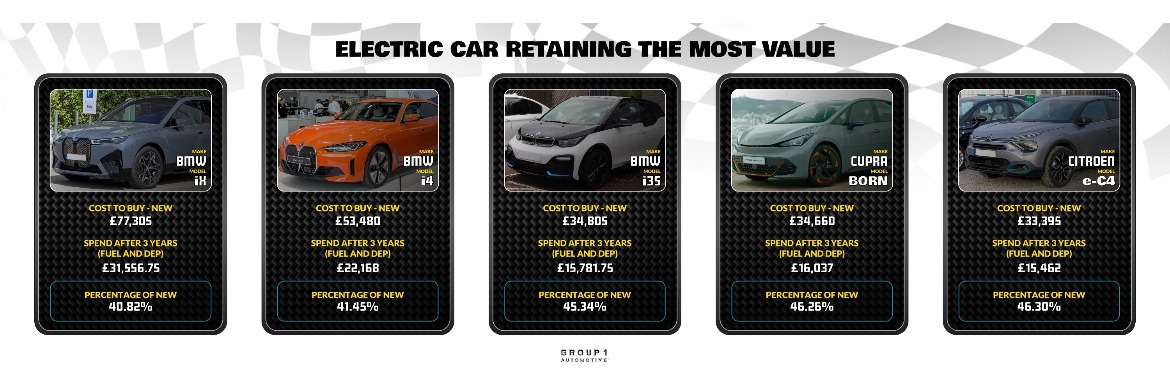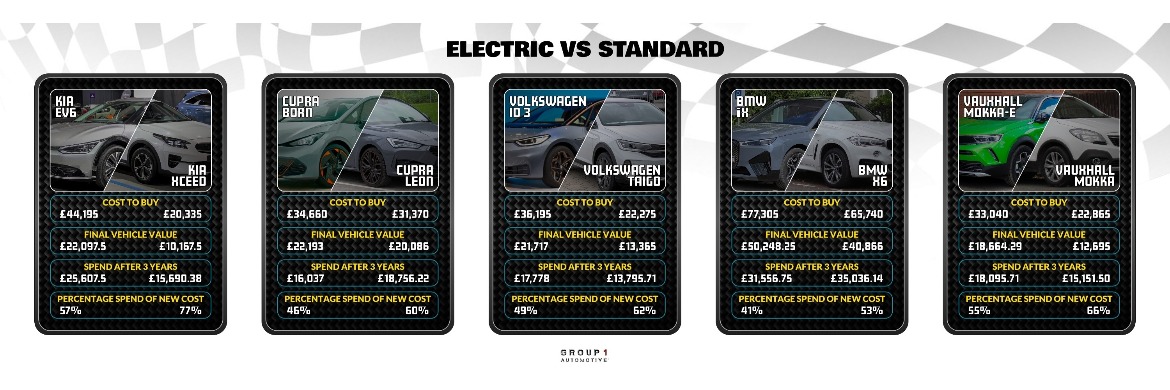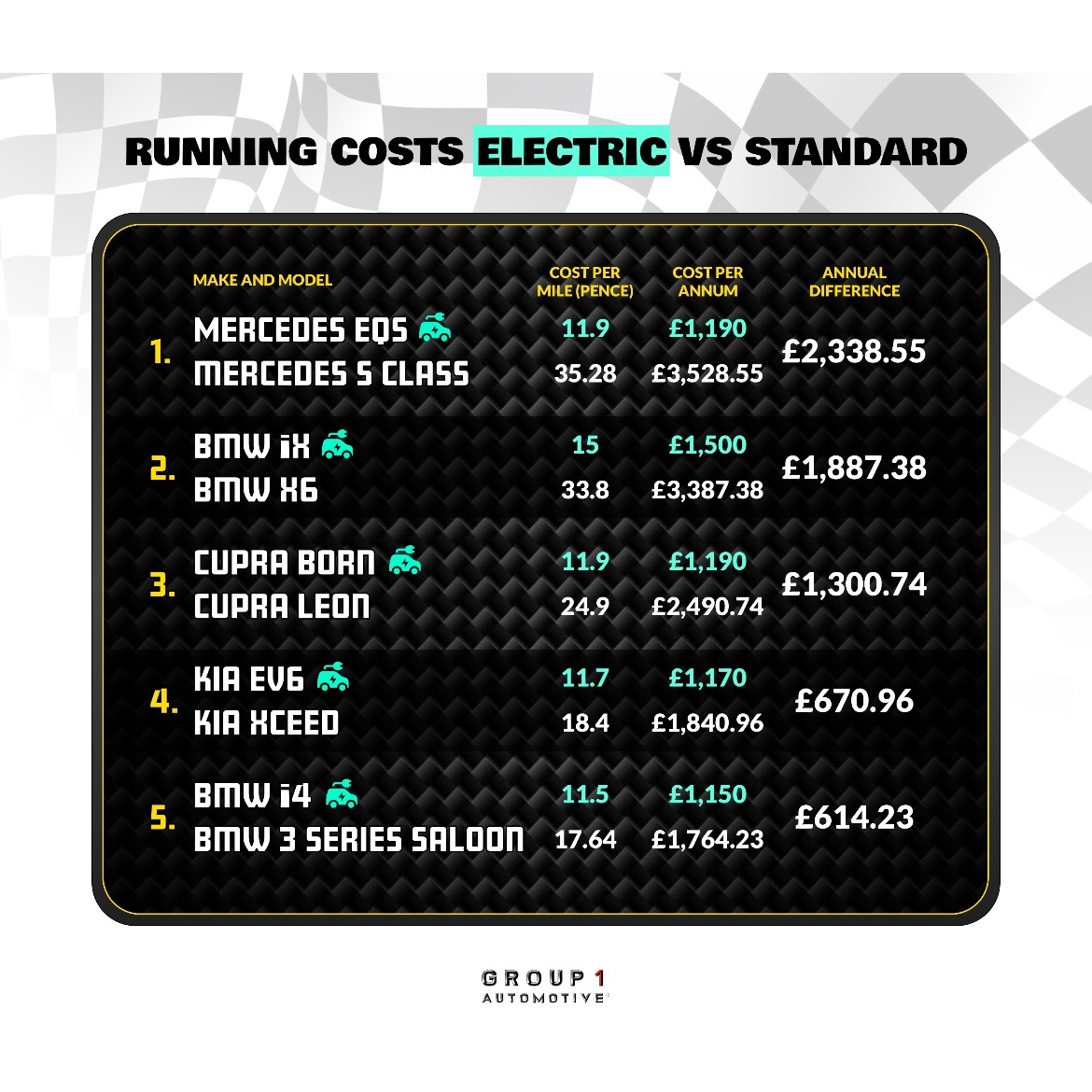Which electric car is best for investment?

-
Recent months have seen die-hard standard fuel drivers switch, or at least contemplate the switch over to a hybrid or electric vehicle. Whether it’s rising prices of traditional fuel, more awareness of the environmental impact, or even the temptation to eliminate road tax and clean air zone fines, there are many people considering making the switch.
However. with the rising home energy costs, there has been much apprehension surrounding the financial cost of home charging, and whether it works out more affordable in the long run to own an electric, hybrid, or standard fuel vehicle.
Many vehicles that are cleaner in terms of emissions are exempt from additional costs like road tax and having to pay the Congestion Charges, Low Emission Zone (LEZ) charges in London and Clean Air Zones in other cities cross the UK.
For city dwellers, this could offer additional incentives to purchase an electric vehicle, alongside opportunities like charging your vehicle at work.
By 2030, pure petrol and diesel cars will be banned from sale in new car showrooms, alongside hybrid variants in 2035. This potentially makes considerations around buying electric more appealing, particularly for those who prefer buying new.
As such, Group 1 Automotive have analysed the best electric car for investment, examining electric cars and their closest standard fuel variant over the course of 3 years and 10,000 miles annually, looking at:
- their cost to buy new
- their value after depreciation
- the amount spent on fuel (whether charging or fuel)
We also compared the best electric cars in comparison to their standard fuel variants, without looking at depreciation, to gauge which have the best prices in terms of running costs.
So, Is buying an electric car a good investment?
-

-
We examined the cost of buying the most popular fully-electric vehicles and compared this with their value after 3 years based on driving 10,000 miles annually.
We examined how much this three-year period costs the customer in terms of depreciation and charging costs, and then calculated this as a percentage of what they would have paid when they bought the car new.
Coming out on top are three BMW models, the iX, i4, and the i3S. Despite being pricier to charge, these models retain their value better due to lower depreciation rates as a result of trust in the brand and the desirability of these models amongst customers.
This was then followed by the CUPRA Born which held up well across the board, including running costs when compared with the closest petrol variant, the CUPRA León.
The Born is CUPRA’s first venture into fully EV models and offers a family hatchback with a sporting edge. In fifth position was the Citroën e-C4, which again offers a family hatchback that was designed to take on the Nissan Leaf and Volkswagen ID. 3.
Retaining just over 70% of their value and coming in at the bottom of the list were the Peugeot e-2008, the new Fiat 500 electric, and the MG5.
Despite the Fiat 500 and the Peugeot e-2008 both having some of the lowest running costs, they failed to hold their value over the 3-year period.
-

-
Our research also found that opting for electric across certain brands and models can save you money in the long run by retaining value based on depreciation rates and fuel costs. The best examples of this are the above five brands and models.
The first car is the Kia EV6 compared with the standard fuel Kia XCeed. Both of these are compact crossover SUVs, and despite the Kia EV6 initially costing more, more of the value is retained over time.
Over the three-year period, you would spend 57% of the new car cost on charging and depreciation, whilst you would spend 77.15% of the new car cost on the Kia Xceed when factoring in depreciation and fuel.
In the second position was the CUPRA Born with a 13.53% difference in car value retention over 3 years when compared with the CUPRA Leon. At just £3,000 extra initially, the CUPRA Born offers excellent value for anyone wanting to enter the electric vehicle market.
This is closely followed by the Volkswagen ID. 3 which would have you spending 49.10% of the new car cost over the three-year period, and when compared with the Volkswagen Taigo, would have you spending only 12.83% of the new car cost less despite initially costing more.
This was followed by the BMW iX which was the top performer in terms of electric car value retention, and when compared with the BMW X6 offered a 12.47% difference in value retention. The differences for the i3S and the i4 were slightly lower when compared with standard fuel variants, but still offered savings over time.
In the fifth position was the Vauxhall Mokka-e, directly compared with the standard fuel variant, the Vauxhall Mokka. Opting for the electric variant rather than the standard fuel one would save you 11.24% over time.
-

-
Without considering depreciation, the models with the biggest difference in running costs between electric and petrol variants are the Mercedes EQS, BMW iX, CUPRA Born, Kia EV6, and the BMW i4.
As we already know, the BMW iX, Kia EV6, CUPRA Born, and BMW i4 already perform well across the other categories, but when it comes to purely comparing running costs alone, the Mercedes-Benz EQS comes out on top.
Opting for an EQS rather than the standard fuel variant, the S class, would save you £2,338.55 per year based on current electricity and fuel prices. When you consider depreciation and the spend on charging over a three-year period based on 10,000 miles, you would spend 52% of the total new cost of the car, meaning that the car places within our top 10 for electric vehicle value retention.
Our research is based on electricity prices rising to 50.0p/kWh, however, the new government energy guarantee means that those on a standard variable tariff will be capped at 34.0p/kWh, and those on a fixed tariff will be limited to 17.0p/kWh.
That means home charging will be even more affordable than the prices shown here, widening the gap between electric and standard fuel variant costs and saving more money over time.
Electric vehicles offer customers a plethora of benefits, from giving drivers the convenience of charging at home and saving money in the process, to reducing their carbon emissions for the benefit of the environment.
Whether you’re interested in the BMW iX, a top performer when it comes to car value retention, or the CUPRA Born that performs across multiple categories, there’s an electric car that suits your needs and lifestyle.
MethodologyWe researched some of the most popular fully-electric vehicles currently on offer using brand pages to find the cost of buying new. The closest standard fuel variant offered by the brand was used to draw a comparison, where there isn’t a direct comparison we used cars of the same classification from the same brand that could be best used for comparison.
We then calculated the pence per mile for electric vehicles, as well as their depreciation over a three-year period based on driving 10,000 miles annually- working with data provided from sources such as whatcar.com. This allowed us to calculate the cost of depreciation and fuel over a three-year period as a percentage of the cost of buying new, allowing comparison between electric vehicles and standard fuel.




